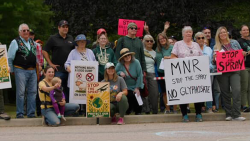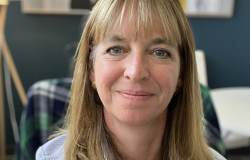In 2024, almost 3,000 people reported experiencing homelessness in Ottawa. With shelters overflowing, the crisis looms large over the nation’s capital.
In response, Mayor Mark Sutcliffe has pledged to end youth homelessness by 2030, though details of how he plans to do so have not yet been made public.
Advocates, however, have sprinted into action, with the Alliance to End Homelessness Ottawa recently hosting the first annual Race to End Homelessness which brought city officials, some of the 75 agencies the Alliance represents, and 227 community participants together to “raise awareness, funds and community momentum to address homelessness in Ottawa.” In total, the event raised $30,877.
“I think we’re riding a wave of urgency that has, in the last year or so, really picked up, and I’m really encouraged by that urgency,” said Kaite Burkholder Harris, executive director of the Alliance.
The mayor’s pledge marked the halfway point of Ottawa’s 10-year Housing and Homelessness Plan, a roadmap meant to ensure adequate, affordable housing and supports for Ottawa’s homeless population. Advocates and experts say ending youth homelessness is the first step.
“If we want to reduce homelessness at large, start with young people,” said Burkholder Harris. “We know that most people experiencing homelessness, or about 50 per cent, were first homeless before the age of 16. If we can break that cycle, that does lead to long-term reductions in homelessness.”
Breaking the cycle would mean housing more people than are becoming homeless in the first place, she said.
While Sutcliffe has not provided specifics on how the city plans to reach its 2030 goal, partnering with the Alliance is a promising first step, says John Heckbert, the executive director of Operation Come Home, a youth homelessness service in Ottawa.
“You want to get some attention to the goal and to get community members aligned to it,” said Heckbert. “The mayor and the Alliance have brought together some really wonderful people who are helping us get to the end of youth homelessness.”
Operation Come Home supports individuals aged 16 to 25 by providing services and hot meals daily in an effort to get youth out of the homelessness cycle.
Cat Carkner, an Alliance volunteer helping coordinate the race, said her experience living in downtown Ottawa and working in the affordable housing sector inspired her.
“I see the need and I see how hard it is to build affordable supportive housing,” Carkner said. “It’s just really important that we bring awareness, so we can get more capital and political will towards that issue.”
Prevention is another necessary step, said Rideau-Vanier Coun. Stéphanie Plante, whose ward has the highest concentration of people experiencing homelessness in Ottawa.
“We have to stop the pipeline of people who end up in shelters,” said Plante.
Plante said the city has been coordinating with Mike Lethby, executive director of the Niagara Resource Service for Youth, a recognized leader in ending youth homelessness, to inform Ottawa’s approach.
Lethby’s work is focused on diversion strategies. Burkholder Harris said that too often, shelter staff assume that when someone shows up at their doors, they have nowhere else to go. This can trap youth in the shelter system, where they are more likely to be exposed to trauma, making it harder to leave.
“We know it just gets harder and harder to get out of that the longer you’re in it,” said Burkholder Harris.
The city hired Lethby to train shelter staff how to help youth explore all possible options, like staying with relatives or friends, before deciding on the shelter. The next step will be hiring dedicated diversion workers at every shelter in the city, said Burkholder Harris.
In the coming months, Sutcliffe says he plans to release concrete details for how the city will reach its goal, but participants at the recent Alliance race are already looking for more ways to take action.
Amanda Jackson ran the five-kilometre race and raised $3,000, the highest amount collected by an individual at the event.
“I need to learn more to help more,” said Jackson, who plans to volunteer with the Shepherds of Good Hope at their new Richcraft Hope Centre in the Lowertown neighbourhood of Ottawa.
“It’s just so important to me as a fellow human; it would be nice if we didn’t see that suffering anymore.”




